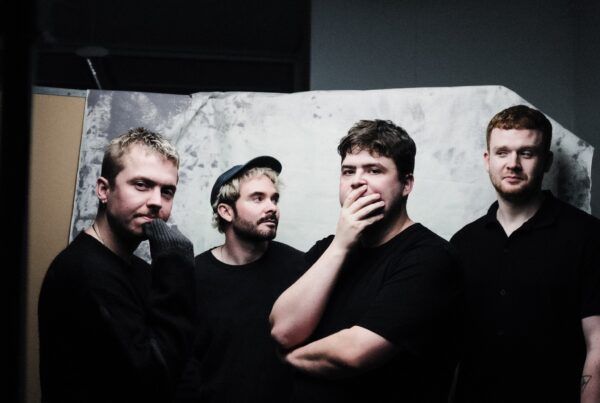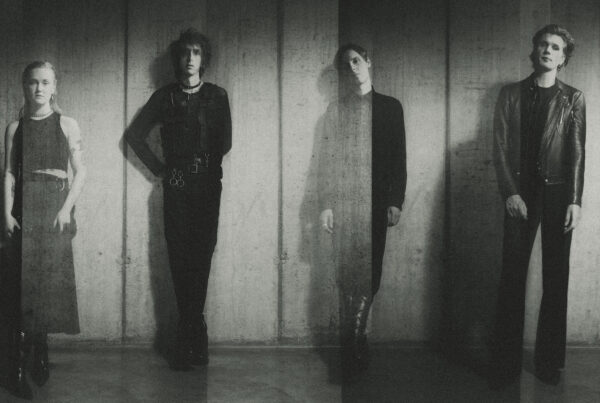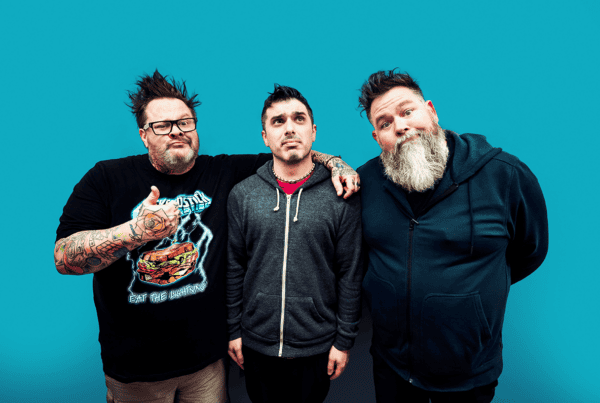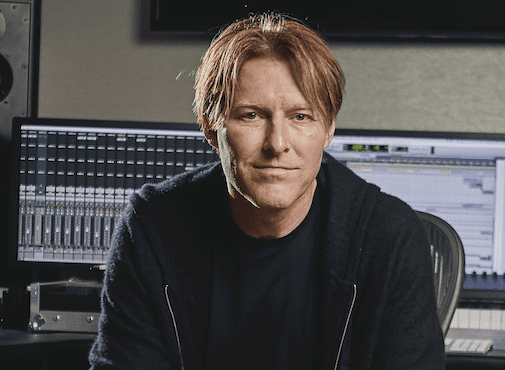In the boxing ring of journalism, Alexander Milas has more than a fair few championship title belts under his name – a little less heavyweight, a little more heavy metal. Embarking as a contributor to Kerrang!, the British oracle on all things hard rock, Milas interviewed a spectrum of the genre’s fabled heroes from Metallica and Slipknot to ‘The Prince of Darkness’ himself, Ozzy Osbourne. With his work across a smattering of publications, his career reached its apex when he became Metal Hammer’s Editor-in-Chief. Picking off the mammoth titles of GQ and Time Out, Milas has been crowned PPA Editor of Year during his decade at the iconic heavy metal music magazine. You might wonder where you could possibly go next, but Alexander Milas shows no signs of slowing down.
“So many people hate the way they’re going to spend their daytime,” Milas speaks, considering his departure from Metal Hammer. “Because I experienced that misery really early on, that has always motivated me to chase things that I’m passionate about. That hasn’t always helped my bank account, but it has always felt like I’ve never wasted my time. I had to think long and hard about what I wanted to do after writing for Metal Hammer. It led to me travelling around the world and meeting so many cool musicians and bands. I didn’t just want to take a desk job and kind of retire – I’m only 40 (which I know sounds like I’m older than time itself to most people), but I still feel like I have a lot ahead of me. I decided I was going to start something of my own and follow my instincts and resulted in Twin V.”
Twin V is a creative solutions company that has become Milas’ full-time occupation since 2017. The award-winning network of photographers, directors, social-media strategists, community managers, audio producers, and journalists, chaired and founded by Milas himself, have produced programmes for Iron Maiden; feature-length documentaries for Amon Amarth; and have even collaborated with the European Space Agency. “A lot of people think Twin V is to do with engines,” Milas laughs, “but the name was inspired by the legend that English archers and their longbows were so effective against mounted, heavily-armoured knights that they’d often have their first two, bowstring-drawing fingers chopped off when they were captured. Holding their two fingers up in the two-fingered salute became a common taunt. It has been a real ride, two years in, and it has been a lot of fun.”
Within two years, Twin V’s clients have been prestigious to say the least. Their work with the European Space Agency gave rise to Spacerocks: a celebration of space exploration and the art, music, and culture it inspires. In 2018, Twin V managed to secure Queen guitarist and astrophysicist Brian May and ESA astronaut Tim Peake at Spacerocks’ panel show at the O2 in London. Speaking on Twin V’s rapid success, Milas is quick to say, “Your relationships are everything.” He continues, “If you ask yourself what a relationship is, it’s just trust. You’ve got to be relied on to do things, and I guess that’s where a lot of it came from. Some of the first people I worked with were people that I knew. Spacerocks, however, was very different. I felt like I had to get out of my own lane for a change, and I had a great opportunity to do that. James Isaacs was the extraordinary arts editor at Metal Hammer who is also a great creative; Todd O’Sullivan, the guy who produces The Golden Gun, it was made a lot easier because I’d had these great relationships with people I’d worked with for years. That’s the defining characteristic of everything successful that I have done: I have worked with great people. A lot of people make this happen, out front and behind the scenes. With Spacerocks, working with a European space agency, that’s a whole new set of relationships, which is of course very different from the music industry. You’d be surprised to know that a lot of people there really love music and art, and want to see it go forward.”
‘Successful’ isn’t quite the word Milas would use to describe himself. “Nothing I do feels successful at the time because I’m in the middle of it. I’m conscious that from the outside it looks like there’s a lot going on, but the truth is, like anybody, I’m still hungry and always looking for what’s next.” He reflects. “I think the worst thing you can ever do is coast on the inertia of past success. It’s done. It’s over. It’s all about what you’re doing right now and being in the moment. What I love about Twin V is that though it’s not always easy, it has given me a huge amount of freedom to literally create things. It’s a huge privilege. If I wake up in the morning and love what I’m doing, then I’m on the right path.”
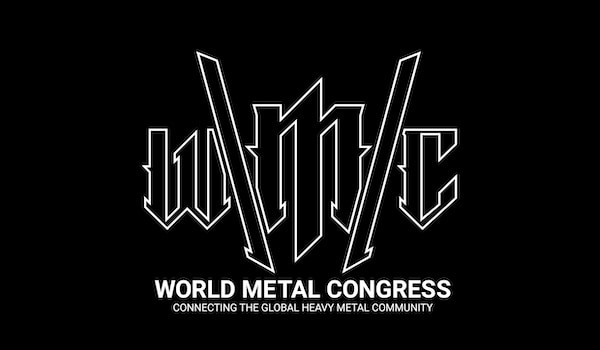
There is a promise of more progress with Spacerocks for 2019; between that, and a number of hush-hush projects Milas wants to keep under wraps, he tells us about World Metal Congress. The inspiration for his, he reveals, was an extension of his work at Metal Hammer. He flew to Mumbai, and other unlikely places across the world, and discovered incredible heavy metal music scenes. “It was just so energising to see so many people cooperating in that way, not only making amazing music, but really caring about metal.” He tells us. “Quite a lot of Metal Hammer’s coverage was about bands from further afield: Indonesia, Afghanistan, Syria – the list goes on. Once I left Metal Hammer, I didn’t want to just let that go. Working with an amazing team of people, we managed to organise a two-day event where we invite people from the industry – not just from the US or the UK – but the world. We’re talking musicians from as far away as Singapore, South Africa India, Lebanon. It’s really a global community. One thing that we hope to achieve is creating a forum for people to connect on a worldwide scale. There will be panels, bands playing, a couple of screenings, one of which is about the metal scene in Syria. Can you believe that exists?”
When we asked Alex to tell us what moment was the highlight of his career, it is quite an unlikely choice. “We got a bunch of metal-heads to write that metal was their religion on the UK census. That was brilliant – not because we beat the scientologists and the druids – but just because it pissed off a lot of people and stirred an incredible debate. I think I must have done 60 interviews around the world about that very thing. We’re having fun, but we were making a very serious point. There are a lot of people for whom heavy metal is more than a genre, it’s a lifestyle. People take it very seriously; it’s worth paying attention to. It felt like a middle finger up to all sorts of people, which I felt was in the spirt of metal.”
This shares a joint position of pride with creating Heavy Metal Truants, a charity he devised with Rob Smallwood, the manager of Iron Maiden. The now infamous charity cycle rides have generated more than £600,000 (not far at all from their goal of a very fitting £666,000) for children’s charities such as Nordoff Robbins, Teenage Cancer Trust, and Childline. “Gosh, that’s an ongoing joy,” Milas says.
The advice Alex has to offer applies not only to journalists, but to any creative. His pearls of wisdom are particularly valuable, after having worked in the industry for decades with people of all positions and walks of life – and, of course, having the honour of being top of the pile. “I feel unworthy to dispense advice really, because in many ways I’m still learning myself.” He confesses. “One thing that I have learned is that ‘it’ll do’ is not good enough – ever. You have to hold yourself to as a high a standard as possible at all times. It’s important to develop and cultivate your contacts. Don’t get over-ambitious; what you see as a photographer when looking at someone in the pit shooting a big band is someone holding a camera, but what you won’t see is how it took 25 years of experience to get there. Patience and humility to learn, enjoying the process, realising that you’re not going to get there today, but maybe tomorrow or the next day or the next day is a big part of it. I think, in a creative industry, you’re probably an idealist at some level because you’ve decided that you want to make the world better. Maybe you want to make it more visually appealing, maybe you want to share things that you are passionate about, so I think that this can lead to impatience. I am 42 years old, and I have never felt that I have reached a plateau that I am happy with. It’s not about reaching a plateau, it’s about asking yourself ‘Do I love what I am doing? Am I happy?’. If you’re waiting for some bright afternoon where everything falls into place, then you’re in the wrong industry. You’ve got to understand that there is always someone who’s going to be further along, and those are the people you can learn from. Let them be your guiding light. I’m very much on the same journey that anyone starting out is, except I’m probably just a little bit further ahead. The best advice I can give to any creative working in any field that is self-driven is to stay optimistic. It’s so easy to be beaten down by rejection, failure and competition. Every gets that way, including me, which is probably symptomatic of being a sensitive creative type. Tomorrow is always another day.”
For more information visit:
https://www.worldmetalcongress.org/


